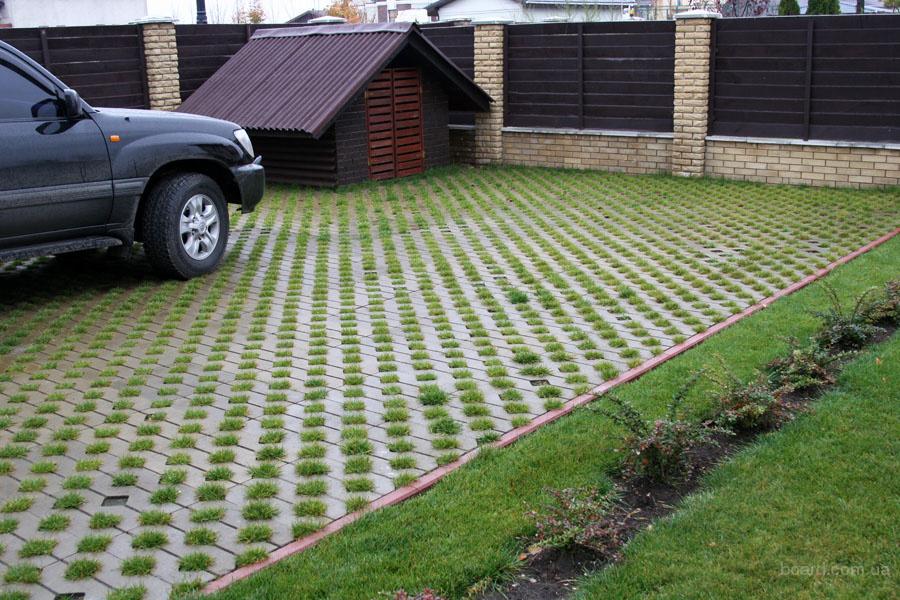Today, when almost every family has one or even several cars, tile for parking in the country or in a country house is a very popular material. Proper improvement of the territory near the house requires the mandatory presence of a parking space for the car. This can be a zone arranged separately from pedestrian paths, or the entire space in front of the house and garage is made out using materials and technologies that provide increased load-bearing characteristics of the surface. A car shining with cleanliness in any weather, the convenience of its operation and maintenance is a worthy reward for the expenses and troubles of a paved parking device.
What are the requirements for parking paving tiles?
In general, they are obvious. The parking surface must, without prejudice to its integrity and appearance, withstand the load that the vehicle has on the cover. Those. parking tile should not break and sag under the weight of the car, its surface should be resistant to abrasion, absorb moisture as little as possible and be frost-resistant.
Strength
The strength of a tile is determined, first of all, by the hardness and cohesive strength of the particles of material between them. The dimensions of the plate also affect it. The thicker it is, the better it resists loads. But with regard to length and width – the inverse relationship. Larger plates quickly fit, but are much more at risk of breaking when the wheels hit their edge. Therefore, paving slabs for car parking should have a relatively small length and width.
Frost resistance and water absorption
A very important characteristic for Russian conditions. Frost resistance is the ability to withstand a certain amount of freezing and thawing without loss of strength. It is very dependent on the moisture absorption of the material. The smaller the latter, the higher the frost resistance.
Parking tile options
Before choosing a cover for parking, you need to know what is offered by the market. Basically, three types of materials are used for paving parking lots.
- Concrete (sand-cement mortar) – in the form of vibrocast or vibropressed paving slabs.
- Clinker (clinker pavers).
- Natural stone – in the form of pavers or flagstone.
Clinker pavers are an elite material. It is made of clay. First, bricks are molded under high pressure, then they are dried according to a certain technology that guarantees complete removal of water, and, finally, they are burned. It turns out a durable moisture-resistant material that can faithfully serve for decades. It has only one drawback – the high price. Moreover, in Russia its production is not properly established. It is necessary to import from Europe, and this makes it even more expensive.
Natural stone is in no way inferior to clinker. In addition, this is material in which there is no shortage in Russia. Stone pavers for parking – a product in the form of a parallelepiped with a face length of 50 … 200 mm. It is placed on a sand cushion or a substrate of dry cement-sand mixture. Absorbing moisture, the mixture hardens and forms a strong stable base, capable of supporting the weight of not only a car, but also a truck. But the disadvantage of stone paving is the same – high price.
Limestone is much cheaper, but its small thickness limits its use for cars. This disadvantage can be compensated by the device of a concrete reinforced base, but this is troublesome and expensive.
Vibropressed paving slabs are the most economical parking coating of all existing ones. Pressing involves the use of high pressure during molding and rigid (with a small amount of water) concrete mixture. As a result, the material is obtained with enhanced performance properties – high strength and frost resistance, low water absorption.
Tile for the machine should have a thickness of at least 50-60 mm, and even better – 80 mm. Dimensions in terms of, as already noted, should be small – no more than 200 mm. Very often, parking is used vibropressed paving slabs in the form of a brick with dimensions in terms of 100×200 mm. When choosing a material, it is better to give preference to unpainted, since the addition of dye reduces the strength of the tile.
Some useful tips
The paved surface must have a margin in relation to the dimensions of the car – at least 1 m from all sides.
The integrity of a tile is greatly influenced by the quality of the substrate, primarily its density. Therefore, the pillow under the tile must be well tamped.
The parking surface should rise several centimeters above the surrounding soil so that puddles do not form in the courtyard after washing the car, rain or snow.
